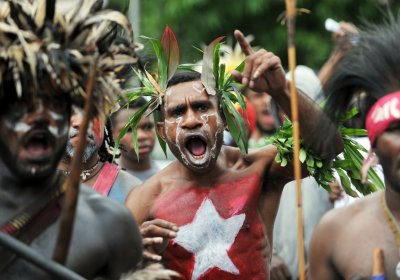New Zealand solidarity activist Maire Leadbeater’s new book, See No Evil: New Zealand’s betrayal of the people of West Papua, features a theme also relevant for Australia. Both countries were involved in the tragic betrayal of West Papua.
West Papua
Indonesia has repeatedly fire-bombed a highland village in West Papuam, where indigenous Papuans have lived for thousands of years, the United Liberation Movement for West Papua (ULMWP) said in a July 16 statement.
The United Nations has declared May 3 as World Press Freedom Day. But one place where there is still no press freedom is Indonesian-occupied West Papua.
Free West Papua Campaign has responded to Australia’s election to the United Nations Human Rights Committee by calling on the Australian government to cease supporting Indonesia’s brutal occupation of West Papua.
In a Facebook statement, FWPC said: “It has to break with the tradition of successive Australian governments that have simply turned a blind eye to the human rights atrocities that have occurred on our doorstep for decades, and instead take a principled stance.”
The occupation of West Papua receives little attention in the UK. This is, in no small part, due to Indonesia’s ban on foreign journalists and its outlawing of West Papuan social movements who try to speak out internationally. However, West Papua has not been forgotten by international corporations, including companies from the UK. For them, Indonesia’s brutal occupation of West Papua provides lucrative opportunities for profit.
The report below was compiled by the Free West Papua Campaign on July 8.
***
We have received urgent reports from West Papua that between June 30 and July 6, about 150 West Papuan people were arrested, and many of them tortured, by the Indonesian police for peaceful actions in the Papuan province of Nabire.
“We have just received urgent news from West Papua that 200 people have been arrested and 26 tortured by Indonesian police, two days before Indonesia hosts the World Press Freedom Day in Jakarta,” the Free West Papua Campaign said on May 1.
More than 500 people were arrested in West Papua on December 18 during self-determination protests that Free West Papua said were demanding the United Liberation Movement for West Papua be granted full membership of the Melanesian Spearhead Group.
The statement below was released by socialist groups from around the Asia-Pacific region on December 1 to coincide with protests across Indonesia and elsewhere in solidarity with West Papua’s struggle for freedom.
* * *
We, the undersigned organisations, express our support to the struggle of the people of West Papua for self-determination.
December 1 marks the West Papua’s Independence Day for Papuans when the Morning Star flag was raised in 1961 before annexed by Indonesia. The flag symbolised the aspiration of many Papuans for a Free West Papua.
Papua New Guinea marked its independence from Australia — achieved in 1975 — on September 16. But West Papua, a province on the same island, continues its struggle for self-determination in one of the world’s least publicised and longest-running independence struggles.
West Papuans won their independence from Dutch colonialism in 1963, but the country was invaded by Indonesia and officially annexed in 1969 after a controversial referendum in which just over 1000 people voted.
 Benny Wenda addressing public forum in Sydney. May 24.
West Papuan independence leader Benny Wenda has been touring Australia, spreading awareness of the West Papuan struggle for freedom from Indonesian rule.
Benny Wenda addressing public forum in Sydney. May 24.
West Papuan independence leader Benny Wenda has been touring Australia, spreading awareness of the West Papuan struggle for freedom from Indonesian rule.
- Previous page
- Page 6
- Next page










